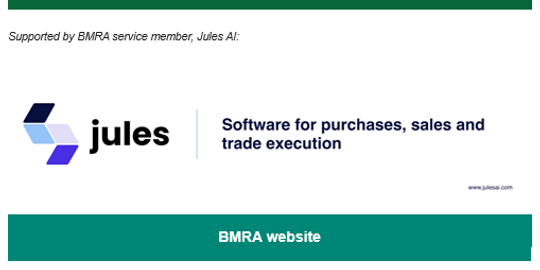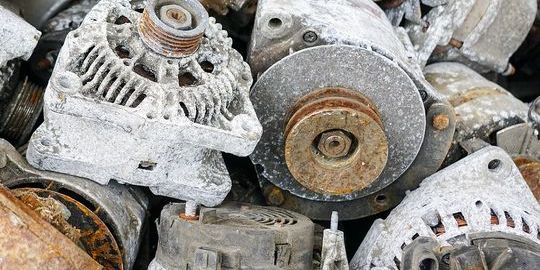EuRIC and EERA issues joint call
The European Recycling Industries’ Confederation (EuRIC)* and the European Electronics Recyclers Association (EERA)** represent the vast majority of technical plastics recyclers collecting, recycling and marketing recycled polymers from Waste Electrical & Electronic Equipment (WEEE) and end-of-life vehicles (ELVs).
The plastics recycling industry has been severely impacted by the COVID-19 pandemic. Technical plastics recycled from ELVs and WEEE are no exception.
Over the last twenty years, technical plastics recyclers operating in Europe have pioneered the recycling of complex thermoplastics used in cars or electrical and electronic appliances, often with no or little support to stimulate end-markets.
A sharp drop in demand combined with plummeting virgin plastics’ prices have further negatively impacted a sector where long term investments in high-tech processes are instrumental to recycle complex plastics from automotive and electronics, representing on average 20% of the overall demand for plastics(1) . In that respect, it is worth noting that post-consumer recycled plastics, be them technical or from packaging, cannot be indexed on oil prices since their cost structure is entirely different. Process costs including cost of incineration or final disposal of unrecyclable fractions, compliance costs stemming from European and National legislation which frame the collection, sorting and recycling of plastics from WEEE, ELVs or packaging and marketing costs negatively impacted by complex and insufficiently harmonised legislation at EU level, in particular for transboundary shipments, and lastly the ‘cost’ of highly-skilled workers as recycling is a job-intensive industry cannot be governed by the fluctuation of crude oil prices.
There is a genuine risk, if no urgent measures are taken, to witness a reduction of Europe’s technical plastics recycling capacity at a time where scaling up is the most needed to meet the EU’s sustainable agenda. The Green Deal followed by the New Circular Economy Action Plan(2) have laid down comprehensive targets to decouple economic growth from resource use, and achieve climate-neutrality by 2050 supporting the more targeted actions set by the European Strategy for Plastics.
Technical plastics recyclers not only fully subscribed to these objectives but play a key role by substituting virgin plastics used in long lifetime products, such as cars, and saving a substantial amount of energy as well as greenhouse gas (GHG) emissions.
Yet, a number of obstacles keep hindering the recycling of plastics from ELVs and WEEE and their use in durable products requiring observance of strict quality requirements. Among them, the need to better enforce proper collection and sorting requirements, insufficient consistency of the European regulatory framework, particularly in relation to the lack of interface between waste and chemicals(3) to assess substances of concern furthermore, the overly complex rules framing shipment of plastic waste for recycling in Europe or the necessity to improve design for recycling.
Aside from these bottlenecks, the largest challenge to overcome today in order to boost investments in technical plastics recycling is the development of stable outlets for quality recycled polymers to the automotive and EEE sectors. This is instrumental both from an industrial perspective to provide the certainty needed by the industry to scale up capacities, and from an environmental viewpoint to reward greenhouse gas emission- and energy savings from recycling when compared with virgin plastics that the market fails to internalise.
The 6.6 million of ELVs treated in 2017 generated over eight million tons of waste(4) , from which more than 1 Mt corresponds to plastics. A rough estimate shows that plastic recycling from those ELVs could potentially avoid 1 Mt of CO2 eq.1 (calculated as the net emissions of the production of plastics from raw materials which is avoided minus those generated by the recycling of plastics), which could offset the carbon footprint of producing 100,000 new cars in EU. A plastic fraction that would be otherwise landfilled or incinerated and that by means of recycling, results in major environmental benefits not only in terms of circularity but to combat global warming.
In that respect, the technical plastics recycling industry unanimously calls for:
- The inclusion, whenever relevant, of recycled content targets in sectorial legislation, such as the ELV or WEEE Directives. The co-signatories entirely agree to the following initiative approved by the European Commission and included in the New CEAP:
To increase uptake of recycled plastics and contribute to the more sustainable use of plastics, the Commission will propose mandatory requirements for recycled content and waste reduction measures for key products such as packaging, construction materials and vehicles, also taking into account the activities of the Circular Plastics Alliance.
With regard to the aforementioned, the inclusion of binding recycled content for recycled PET (rPET) in the Single-Use-Plastics (SUP) Directive has been a game-changer for packaging plastics recyclers by completely decorrelating prices of rPET with virgin PET prices, which themselves depend on oil prices, and thus enabling packaging plastics recyclers to invest in new capacities and technologies.
The revision of the ELV Directive offers, in the field of technical plastics, the first opportunity to set gradual and fully achievable recycled content targets for post-consumer thermoplastics in new cars.
- 2. Setting up incentives, which can take the form of tradable recycling certificates or tax breaks, to reward GHG savings stemming from recycling and the use of recycled materials in new products alongside the entire (circular) value chain.
- 3. Devising environmental performance labels along with energy efficiency labels will empower consumers to make informed choices and reward producers using circular plastics, which is largely ignored5 today. Such labelling will support modulation of fees of EPR schemes incentivizing the use of recycled plastics in new products.
- 4. Supporting voluntary commitments with measurable results to boost cooperation along the plastics value chain supplying in the EEE and automotive sectors, in key matters such as collection & sorting. Supporting design for recycling or recycled content, as currently advanced by the Circular Plastics Alliance, as well as EU funded projects aiming at increasing the circularity of plastics such as the PolyCE Project focusing on significantly reducing the use of virgin plastics and enhancing the use of recycled plastics in new electronics applications.
These measures are all the more urgent given the extremely negative impacts of the COVID-19 pandemic on technical plastics recyclers to ensure that the current crisis situation will not further jeopardise the goals set by the European Strategy for Plastics.
EuRIC - The European Recycling Industries’ Confederation, of which BMRA is a member, is the umbrella organisation for recycling industries.
Through its Member Federations from 21 EU&EFTA countries, EuRIC represents across Europe over:
- 5,500+ companies generating an aggregated annual turnover of about 95 billion €, including large companies and SMEs, involved in the recycling and trade of various resource streams;
- 300,000 local jobs which cannot be outsourced to third EU countries;
- Million tons of waste recycled per year (metals, paper, glass, plastics, textiles, tyres and beyond);
By turning wastes into resources, recycling is the link which reintroduces recycled materials into the value chains
again and again. Recyclers play a key role in bridging resource efficiency, climate change policy and industrial transition.


